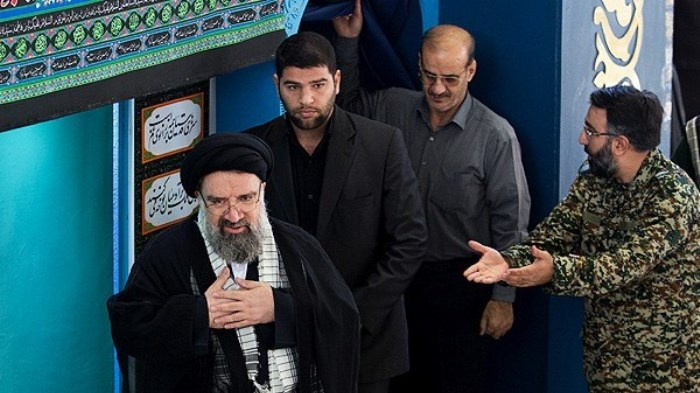Friday Prayers in Iran: Paris attacks and double standards

(Ahmad Khatami preparing to make the sermons. Photo: Soheil Sahranavard/Fars)
Since the 1979 Islamic Revolution, Friday prayers in Iran have been regulated by the state. The Supreme Leader directly supervises the Council for the Policymaking of Friday Prayer Leaders which in turn appoints the leaders for Friday prayers across the country, except for larger cities whose sermonizer is directly appointed by the Supreme Leader. The position of sermonizer may be either permanent, such as in Mashad where Ayatollah Alamolhoda serves in the position, or rotate among a number of clerics, such as the case of Tehran where five Ayatollahs, Ahmad Khatami, Seddighi, Movahhedi Kermani, Jannati and Kashani serve as “temporary” leaders of the Friday prayers.
Sermons by the leaders are usually divided between two separate, yet related, themes, i.e. the religious sermon, in which the Friday prayers’ leader speaks of some Islamic spiritual topic, such as the virtue of passing alms, and the political sermon, where he discusses current affairs. For each week, themes are usually outlined by the Council for Policy Making, but the details are left to the sermonizers. Occasionally, a “pre-sermon speaker”, usually a senior or mid-level official from any of the three branches of powers or military forces, is invited to the Friday prayers to speak to the public about a relevant subject.
This week, the pre-sermon speaker in Tehran’s Friday prayers was Brigadier General Mohammad-Reza Naghdi, head of the Basij forces. Naghdi spoke about ‘infiltration’, the latest buzzword of Iranian politics: “for the enemy, infiltration is not a tactic, but a strategy,” he said. “The US’ strategies of terror, coup, military attack, and its political, cultural, media and economic weapons have failed. Having no weapons left, they are now speaking of dialogue.”
Ayatollah Ahmad Khatami (not to be confused with former president Mohammad Khatami) served as the prayers leader in Tehran this week. Khatami expressed a backhanded condolence for the Paris attacks. “We strongly condemn the terrorist attacks in France and anywhere across the world” Khatami said. “[But] they are reaping what they sowed,” he added. Khatami added that ISIS/Da’esh has no mission but to tarnish the face of Islam, since “it has not uttered a single word against the Zionist regime so far”. The ayatollah condemned the EU and the US of double standards in dealing with terrorism: “If the occupying Zionist regime launches terror attacks, it is good terrorism [according to the West], but when such attacks come to France, they become bad terrorism”.
In Urmia in northwest Iran, the Friday prayers’ leader Ayatollah Ghoreishi expressed similar remarks regarding the Paris attacks. “Westerners are now having trouble with terrorist and takfiri groups whom they helped to defeat Bashar Assad,” he said. “One day before [the Paris attacks], hundreds of people were killed in Lebanon. Neither France nor any other Western country condemned this attack. Thousands of Muslims die and no one in the West denounces that, but if a few are killed in the West, the entire world condemns [the terrorist attack]”.
In Mashad, Ayatollah Alamolhoda also criticized the dual attitude towards the terrorist attacks in Paris and in the Lebanese capital of Beirut. He implicitly targeted President Hassan Rouhani, whose message of condolence for Paris was released before a similar message for Beirut. “Discrimination is rampant across the world unfortunately,” Alamolhoda said, referring to the 48 hour difference between these two messages.

